
Theoretical Ecology
metrics 2024
Transforming ecological studies through theoretical excellence.
Introduction
Theoretical Ecology, published by SPRINGER HEIDELBERG, is a premier journal in the field of ecological modeling and theory, exemplifying the intersection of rigorous quantitative analysis and ecological understanding. With its ISSN 1874-1738 and E-ISSN 1874-1746, this journal has been a valuable resource for researchers since its inception in 2008, with a commitment to publish cutting-edge research until 2024. The journal's 2023 category quartiles demonstrate its impact, ranking Q3 in Ecological Modeling and Q2 in Ecology, reflecting its significance within the academic community. Furthermore, its Scopus rankings position it among the top tier of environmental science journals, ranking #181/461 in Ecology and #21/41 in Ecological Modeling. While the journal does not offer open access, it is an essential publication for those looking to deepen their understanding of theoretical frameworks that drive ecological research and practice. By providing a platform for innovative theories and models, Theoretical Ecology plays a crucial role in shaping future ecological studies and informing policy decisions in environmental management.
Metrics 2024
 0.47
0.47 1.20
1.20 1.40
1.40 41
41Metrics History
Rank 2024
Scopus
IF (Web Of Science)
JCI (Web Of Science)
Quartile History
Similar Journals

RUSSIAN JOURNAL OF ECOLOGY
Illuminating the Path to Sustainable Ecological SolutionsRUSSIAN JOURNAL OF ECOLOGY, published by PLEIADES PUBLISHING INC, stands as a critical resource within the field of ecology, offering an array of research insights that span various ecological topics. With an ISSN of 1067-4136 and an E-ISSN of 1608-3334, this journal has been consistently disseminating knowledge since its inception in 1996, now converging towards 2024. Despite its current Q4 ranking in the Ecology, Evolution, Behavior and Systematics category, the journal has carved out a niche in the publication landscape, particularly for scholars focused on the rich and diverse ecological phenomena of Russia and surrounding territories. The journal aims to foster interdisciplinary collaboration and innovation by providing a platform for the dissemination of high-quality research. While it currently lacks open access options, readers can expect in-depth studies and analytical discourses that contribute meaningfully to the global understanding of ecological systems. With an impressive Scopus rank, this journal remains an important outlet for researchers, professionals, and students committed to advancing ecological science.
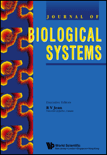
JOURNAL OF BIOLOGICAL SYSTEMS
Connecting theory and practice in biological research.Journal of Biological Systems is a prestigious journal published by World Scientific Publishing Co. Pte Ltd that serves as a vital platform for interdisciplinary research in the domains of agricultural and biological sciences, applied mathematics, and ecology. With its inception in 1996 and converging insightful contributions up to the present, the journal showcases innovative research that influences both theoretical and practical aspects within these critical fields. Its commendable Q2 category rankings in 2023 highlight its commitment to high-quality scholarship, achieving rankings of #62 in Agricultural and Biological Sciences, #243 in Applied Mathematics, and #204 in Ecology on the respected Scopus index. While the journal maintains a traditional publishing model, its rigorous peer-review process ensures that it meets the highest academic standards. The Journal of Biological Systems is essential reading for researchers, professionals, and students keen to keep abreast of the latest developments and methodologies impacting ecological systems, mathematical applications, and biological innovations.
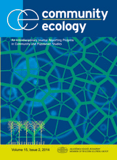
COMMUNITY ECOLOGY
Exploring the Intricacies of Ecological InteractionsCOMMUNITY ECOLOGY is a distinguished journal published by Springer Heidelberg that focuses on the intricate dynamics of ecological interactions within communities. Established in 2000 and continuing robustly through to 2024, this journal aims to disseminate significant research findings that contribute to the understanding of ecological processes, species interactions, and community structures. With an ISSN of 1585-8553 and an E-ISSN of 1588-2756, the journal holds a commendable position in the academic sphere, reflected in its Q2 quartile rankings in the categories of Ecology and Ecology, Evolution, Behavior and Systematics. It boasts an impressive Scopus ranking within the 57th percentile for both Agricultural and Biological Sciences and Environmental Science fields, attesting to its relevance and influence. Though it does not currently operate under an open access model, COMMUNITY ECOLOGY remains a vital resource for researchers, professionals, and students eager to advance their knowledge in community ecology, highlighting the importance of collaborative research in addressing ecological challenges globally.
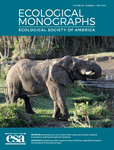
ECOLOGICAL MONOGRAPHS
Pioneering comprehensive studies in ecology and systematics.ECOLOGICAL MONOGRAPHS, published by WILEY, stands as a premier journal in the field of ecology, evolution, behavior, and systematics, with an impressive impact factor and ranking in the 96th percentile among its peers. Since its inception in 1974, this journal has offered comprehensive insights and advanced knowledge on ecological phenomena, serving as a vital resource for researchers, professionals, and students alike. With its commitment to publishing high-quality, peer-reviewed articles, it operates within the esteemed Q1 category of ecology, solidifying its reputation as a leading platform for innovative research. Though not available as open access, ECOLOGICAL MONOGRAPHS ensures broad reach and visibility through its rigorous editorial standards and substantial scholarly contributions. As it continues to aggregate vital ecological data and synthesize research across multiple converged years, this journal remains invaluable for those dedicated to understanding complex ecological interactions and their implications for environmental policy and management.

Ecological Complexity
Exploring the depths of complex ecological systems.Ecological Complexity is a prestigious academic journal published by Elsevier, dedicated to advancing the understanding of complex ecological systems through innovative modeling and analysis. With an ISSN of 1476-945X and an E-ISSN of 1476-9840, this journal has been a critical platform for researchers since its inception in 2004, with a forecasted operation until 2024. The journal enjoys an esteemed Q2 ranking in both the Ecological Modeling and Ecology, Evolution, Behavior and Systematics categories as of 2023, highlighting its significant impact and relevance in the field. Additionally, it ranks impressively in Scopus, with 85th out of 721 in the Ecology category and 11th out of 41 in Ecological Modeling, illustrating its commitment to high-quality research dissemination. While it does not currently offer Open Access options, Ecological Complexity remains a vital resource for ecologists, environmental scientists, and interdisciplinary researchers aiming to deepen their understanding of ecological interactions and systems. The journal is based in the Netherlands at RADARWEG 29, 1043 NX, AMSTERDAM, and serves as an essential forum for fostering innovative research that bridges theoretical concepts and practical applications in ecology.
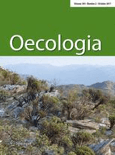
OECOLOGIA
Pioneering Research at the Frontier of Ecology and BehaviorOECOLOGIA is a prestigious journal dedicated to the interdisciplinary fields of ecology, evolution, behavior, and systematics, published by Springer. Established in 1968, this journal has consistently contributed to the scientific community, maintaining a strong impact factor reflected in its Q1 ranking within its category for 2023, and an impressive 79th percentile among 721 journals in the Scopus rank for Agricultural and Biological Sciences. With a commitment to advancing ecological knowledge and fostering innovative research, OECOLOGIA serves as a vital platform for researchers, professionals, and students exploring complex ecological dynamics and evolutionary processes. Although it does not offer open access, the journal remains dedicated to high-quality, peer-reviewed publications that inspire and inform the next generation of ecological science. For those interested in the latest trends and significant findings in biology and ecology, OECOLOGIA is an essential resource that continues to shape the discourse and understanding in these critical fields.

Annual Review of Ecology Evolution and Systematics
Illuminating the Path of Ecological and Evolutionary ResearchThe Annual Review of Ecology, Evolution, and Systematics, published by Annual Reviews, is a leading academic journal dedicated to advancing the understanding of ecological and evolutionary processes. With a commendable impact factor and impressive rankings—9th in both the Ecology, Evolution, Behavior and Systematics category and the Environmental Science category—this journal is recognized for its rigorous peer-reviewed articles that synthesize research findings across a wide range of topics within the fields of ecology and evolutionary biology. Established in 2003, this annual publication aims to provide researchers, professionals, and students with comprehensive insights into the latest developments and trends within these dynamic disciplines. By facilitating access to high-quality scholarly articles, the Annual Review of Ecology, Evolution, and Systematics continues to play a crucial role in fostering scientific discourse and discovery.
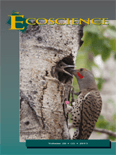
ECOSCIENCE
Exploring the intersection of ecology and environmental science.ECOSCIENCE, published by Taylor & Francis Inc, stands as a prominent journal in the fields of Ecology and Environmental Science, recognized for its commitment to advancing knowledge since its inception in 1994. With an ISSN of 1195-6860 and an E-ISSN of 2376-7626, the journal caters to a diverse audience of researchers, professionals, and students passionate about ecological and environmental issues. In 2023, it achieved Q2 and Q3 rankings in the Scopus category of Ecology and Evolution, Behavior and Systematics, reflecting its significance within the academic community. Moreover, ECOSCIENCE occupies notable positions in Scopus rankings, including Rank #324 in Agricultural and Biological Sciences and Rank #210 in Environmental Science, symbolizing its role as a catalyst for disseminating high-quality research. Although currently not open access, the journal's multifaceted scope encourages in-depth discussions on ecological diversity, conservation strategies, and sustainable practices, making it an invaluable resource for those engaged in ecological research and practice.
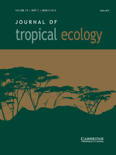
JOURNAL OF TROPICAL ECOLOGY
Advancing Knowledge for a Sustainable FutureThe JOURNAL OF TROPICAL ECOLOGY, published by Cambridge University Press, serves as a pivotal platform for advancing knowledge in the field of ecology, particularly within tropical environments. With an ISSN of 0266-4674 and an E-ISSN of 1469-7831, this esteemed journal has been a key resource since its inception in 1985, maintaining a focus on empirical research that addresses the complexities of tropical ecosystems. It holds a respectable Q3 ranking in the Ecology, Evolution, Behavior and Systematics category as of 2023, indicating its significant contribution to the field, although it remains within the competitive mid-range. The journal publishes original research, reviews, and methodological articles that illuminate the rich biodiversity and unique ecological processes of tropical regions, fostering a deeper understanding of conservation challenges. Accessible from the United Kingdom, this publication appeals to a diverse audience of researchers, professionals, and students keen on exploring ecological dynamics in tropical settings, and plays a crucial role in promoting scientific discourse and collaborative efforts aimed at preserving our planet's vital ecosystems.

Frontiers in Ecology and Evolution
Empowering discovery in the realms of ecology and evolutionary biology.Frontiers in Ecology and Evolution, published by FRONTIERS MEDIA SA, stands as a premier open-access journal dedicated to the exploration and discourse in the interdisciplinary fields of ecology and evolutionary biology. With its inception in 2013, this journal has rapidly ascended to a prestigious position, securing a Q1 ranking in both Ecology and Ecology, Evolution, Behavior and Systematics categories, reflecting its influential impact in the respective fields. Operative from Switzerland, Frontiers in Ecology and Evolution enables researchers, professionals, and students to access high-quality research without barriers, promoting collaboration and innovation. The journal covers a broad range of topics, from ecological dynamics to evolutionary strategies, facilitating profound insights that drive scientific advancement and understanding. With a remarkable position in Scopus rankings—ranking #218 in Ecology, Evolution, Behavior and Systematics and #145 in Environmental Science—this journal is essential for anyone keen on contributing to or staying updated with contemporary research in ecology and evolution.